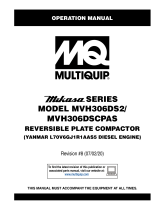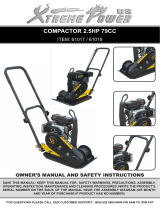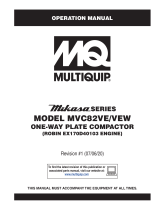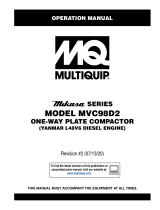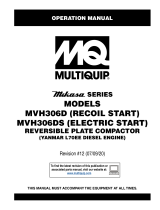Page is loading ...

SAVE THIS MANUAL: KEEP THIS MANUAL FOR SAFETY WARNINGS, PRECAUTIONS, ASSEMBLY,
OPERATING, INSPECTION, MAINTENANCE AND CLEANING PROCEDURES. WRITE THE PRODUCT’S
SERIAL NUMBER ON THE BACK OF THE MANUAL NEAR THE ASSEMBLY DIAGRAM (OR MONTH
AND YEAR OF PURCHASE IF PRODUCT HAS NO NUMBER)
OWNER’S MANUAL AND SAFETY INSTRUCTIONS
PLATE COMPACTOR
ITEM: 61006/61007
FOR QUESTIONS PLEASE CALL OUR CUSTOMER SUPPORT: (909) 628 4900 MON-FRI 9AM TO 3PM PST

IMPORTANT SAFETY INFORMATION
GENERAL SAFETY WARNINGS
Read all safety warnings and instructions. Failure to follow the warnings and instructions may
result in electric shock, re and/or serious injury. Save all warnings and instructions for future
reference.
SAFETY
WARNING DO NOT use this product or any available optional equipment without rst completely reading
and understanding these instructions and any additional instructional material such as owner’s manuals,
service manuals or instruction sheets supplied with this product or optional equipment. When using an
electrical appliance, basic precautions MUST be followed to reduce the risk of re, electric shock and
personal injury.
1
DANGER: CARBON MONOXIDE Using a plate compactor indoors CAN KILL YOU IN MINUTES.
Engine exhaust contains carbon monoxide (CO). This is a poison gas you cannot see or smell. If you
can smell the engine exhaust, you are breathing CO. Even if you cannot smell the exhaust, you could
be breathing CO.
NEVER use a plate compactor inside homes, garages, crawl spaces, or other partially/fully enclosed
areas. Deadly levels of carbon monoxide can build up in these areas. Using a fan or opening windows
and doors does NOT supply enough fresh air. ONLY use outside and far away from windows, doors, and
vents. These openings can pull in engine exhaust.
WARNING: The exhaust from this product contains chemicals known to the State of California to cause
cancer, birth defects, or other reproductive harm.
WARNING: This engine may emit highly ammable and explosive gasoline vapors, which can cause
severe burns or even death if ignited. A nearby open ame can lead to explosion even if it isn’t directly
in contact with gasoline.
DO NOT operate near an open ame.
DO NOT smoke near the plate compactor.
ALWAYS turn the plate compactor off before refuelling, allow it to cool for at least 2 minutes before
removing the fuel cap. Loosen the cap slowly to relieve pressure in the tank.
DO NOT overll the tank. Gasoline may need to expand during operation. DO NOT ll to the top of the
tank, allow for expansion.
ALWAYS for spilled fuel before operating.
Empty the fuel tank before storing or transporting the plate compactor.
DO NOT use the plate compactor in wet conditions.
DO NOT allow children to or non-qualied persons to operate the plate compactor.
DO NOT touch hot surfaces. Pay attention to warning labels on the machine identifying hot parts.
Allow the unit to cool down after use before touching the engine or areas of the plate compactor that
become hot during use.
Only use the compactor for intended purposes.
KEEP hands and feet clear of rotating and moving parts as they will cause injury if contacted.

2
IMPORTANT SAFETY INFORMATION
Operate the plate compactor on at, level surfaces only.
Turn the engine OFF when the compactor is not in use.
DO NOT operate or service this machine before reading this entire manual.
Never operate this equipment without proper protective clothing, shatter proof ANSI-approved glasses,
steel-toed boots, and other protective job site devices.
NEVER operate the equipment while under the inuence of medication, drugs or alcohol.
ALWAYS check the machine for loosened bolts and threads BEFORE every use.
ALWAYS wear proper respiratory, hearing and eye protection during operation.
The Manufacturer does not assume responsibility for any accident due to equipment modications and
will also void the warranty.
NEVER use accessories or attachments that are not recommended by STARK for this model of plate
compactor.
DO NOT add fuel to the plate compactor if it placed on top of a plastic surface such as a pickup truck
bed with a plastic liner. This creates the possibility of ignition or explosion due to static electricity build
up.
ALWAYS refuel in a well ventilated area. NEVER operate near open ames, sparks or other item that
could cause the gas fumes to ignite.
Before performing compacting work near buildings or above pipelines, check the effect of the vibrations
on the buildings and pipelines. If necessary, immediately stop the compacting work.
WARNING: This unit produces heat when running. Temperatures near exhaust can exceed 150 F (65
C).
NOTE: We suggest running the plate compactor engine at least once a month in order to maximize the
lifespan of the machine.
Plate compactors are heavy units and should be positioned by two people of appropriate strength. Using
the lifting handles provided on the machine, along with correct lifting techniques.
DO NOT operate the machine unless all protective guards are in place.
ENSURE that the walls of a trench are stable and will not col- lapse due to the action of the vibration,
prior to commencing compaction.
ENSURE that the area to be compacted does not contain any “live” electrical cables, gas, water or
communication services which may be damaged by the action of the vibration.
EXERCISE CARE when operating unit. Exposure to vibration or repetitive work actions may be harmful
to hands and arms.
DO NOT increase the governed no-load motor speed above 3,500 r/min. Any increase may result in
personal injury and damage to the machine. BE CAREFUL not to come in contact with the mufer when
the engine is hot, since it can cause severe burns.
FIRE & EXPLOSION HAZARDS: PETROL is extremely ammable and explosive under certain
conditions. ENSURE that petrol is only stored in an approved storage container. DO NOT refuel the
motor while it is in operation or hot.

OPERATION
PRE-START INSPECTION: The following Pre-start-up inspection must be performed before the start of
each work session or after every four hours of use, whichever is rst. If any fault is discovered, the compactor
must not be used until the fault is rectied
3
1. Thoroughly inspect the compactor for signs of damage. Check components are present and secure. Pay
special attention to the belt drive safety guard tted between the engine and the vibrator unit.
2. Check the engine oil level and top up as necessary.
3. Check the engine fuel level and top up as necessary.
4. Check for fuel and oil leaks.
START AND STOP PROCEDURE - DIESEL ENGINE
1. Open the fuel cock.
2. Turn the governor lever to “STARTING” position.
3. Hold the recoil starter handle.
4. Pull the starter handle until you feel the resistance, then return handle
slowly.
5. Press the decompression lever to “Non-compression” position. The lever
will return back automatically after the engine started.
6. Hold the recoil starter handle with two hands and pull it hard.
7. It is difcult to start the engine at cold weather. Remove the rubber plug
on the cylinder head and ll about 2CC engine oil before starting.
8. To stop the engine, set the governor lever to the low speed position, then
run the engine at zero load ve minutes.
9. Set the governor lever to the “STOP” position. Do not stop the engine with the decompression lever.
10. Set the fuel cock the “OFF” position.
11. Pull the recoil starter handles slowly, until you feel resistance. (At this point,the decompression just
begins and intake/exhaust valves are both closed, thus the cylinder can be prevented from rust.)
12. Concerning the electric starting engine, directly turn the starting key to “CLOSE” position.
START AND STOP PROCEDURE - PETROL ENGINE
1. Open the fuel tap by moving the fuel ON/OFF lever fully to the right.
2. If starting the engine from cold, set the choke ON by moving the choke lever fully to the left. If restarting a
warm engine,the choke is usually not required. However,if the engine has cooled to a degree, partial choke
may be required.
3. Turn the engine ON/OFF switch clockwise to the “1” position.
4. Set the throttle to the idle position by moving the throttle lever fully to the right. Do not start the engine on
full throttle,as the compactor will vibrate as soon as the engine starts.

OPERATION
4
5. Taking a rm hold of the control handle with one hand,grasp the recoil starter handle with the other. Pull
the recoil starter until engine esistance is felt, then let starter return.
6. Taking care not to pull the starter’s cope fully out, pull the starter handle briskly.
7. Repeat until the engine res.
8. Once the engine res gradually,set the choke lever to the OFF position by moving it to the right.
9. If the engine fails to re after several attempts follow the trouble-shooting guide on page 5. TO stop the
engine,set the throttle to idle and turn the engine ON/OFF switch counter-clockwise to the “0” position.
10. To stop the engine,set the throttle to idle and turn the engine ON/OFF switch anticlockwise to the “0”
position.
11. Turn the fuel off
The machine is best suited to the compaction of bituminous and granular materials e.g. granular soils such
as silt and clay are best compacted using the impact force produced by a vibrating rammer. Where possible
the site should be graded and leveled before commencing compaction.
Correct moisture content in soil is vital to proper compaction. Water acts as a lubricant to help slide soil
particles together. Too little moisture means inadequate compaction; too much moisture leaves water-lled
voids that weakn the soil’s load-bearing ability. Compaction of dry materials will be facilitated by moistening
with a water hose tted with a sprinkler.
Excessive watering or water content will cause the machine to stall. The optional water tank kit is recommended
when the machine is used on bituminous surfaces as the water lm prevents a build up of material on the
underside of the plate. Use unleaded grade petrol and ensure that the fuel is free from contamination. The
vibratory motion provides a self propelling action. Position the handle at the opposite end of the machine to
the vibrator.
Increase the motor speed to the maximum setting using the hand throttle lever, before commencing
compacting. The machine should be controlled by grasping the handle with both hands and applying restraint
to control the forward motion. Steer the machine by moving the handle sideways to the right or left.
ALWAYS maintain good footing so that you do not slip and loose control when starting or operating the
machine. If the optional water tank is tted,the ow rate can be controlled by adjusting the cock in the
supply hose to the sprinkler bar.

5
TABLE 3. TIGHTENING TORQUE(in/kg/cm)Diameter
CARE AND MAINTENANCE
Check the oil level in the motor crankcase daily.
Check the vibrator oil level weekly.
Inspect the rubber anti vibration mounts for wear or deterioration.
If the optional water tank is tted inspect the water hose and its connections to ensure that they do not
leak.
Clean the underside of the plate regularly to prevent a build up of material.
Inspection and other services should always be carried out on hard and level ground with the engine shut
down.
INSPECTION AND MAINTENANCE SERVICE TABLES
To make sure your plate compactor is always in good working condition before using, carry out the
maintenance inspection in accordance with Tables 1 through 3
These inspection intervals are for operation under
normal conditions. Adjust your inspection intervals
based on the number hours plate compactor is in
use, and particular working conditions
Check for loose screws including tightness. See Table 3 below(tightening torque), for re-tightening.

6
CARE AND MAINTENANCE
CHANGING VIBRATOR OIL
When changing the vibrator oil, remove the drain plug located at the bottom-right of the vibrator, and simply
tip the compactor to drain the oil. Note that the oil will drain more easily while it is hot. Replace the oil with
200ML of 10W-3C motor oil.
AIR FILTER
1. The air lter element should be cleaned because a clogged air cleaner can cause poor engine starting,
lack of power and shorten engine Iife substantially.
2. To clean or replace air lter loosen the wing nut on the air lter housing(Figure 1),
remove the cover and take out air lter cartridge. If only cleaning of the air lter is desired
blow through the air lter cartridge from the inside, moving a jet of dry compressed air
up and down until all dust is removed.
NEVER attempt to check the V-belt with the engine running. Severe injury can occur
if your hand gets caught between the V-belt and the clutch. Always use safety gloves.
CHECKING AND REPLACING THE V-BELT AND CLUTCH
After 200 hours of operation, remove the upper belt cover to check the V-belt
tension (Figure 2). Tension is proper if the belt bends about 10mm when
depressed strongly with nger between shafts. Loose or worn V-belts reduces
power transmission efciency, causing weak compaction and reduces the life
of the belt itself.
Whenever the compactor’s vibration, becomes weak or lost during normal
operation regardless of operation hours,check the V-belt and clutch
immediately.
Replacing the V-belt: Remove the upper and lower belt covers. Engage an offsel wrench(13mm) or the
like to vibrator pulley (lower)fastening bolt. Engage waste cloth or the like at midway of V-belt on the left
side and while pulling it back strongly,rotate the offset wrench clockwise so that the V-belt will come off
Re-installing the V-belt: Engage V-belt to lower vibrator pulley and push the V-belt to left side of upper
clutch andin the same manner as in removal, rotate offset wrench clockwise so that the V-belt goes back
on.
Checking the Clutch: Check the clutch simultaneously with V-belt checking. With belt removed, check
outer drum of the clutch for seizure and “V” groove for wear or damage with your eyes. Clean the “V”
groove as necessary. Wear Of lining or shoe should be checked with running check. If the shoe is worn,
power transmission becomes decient and slipring will result.

7
SPECIFICATIONS
MOTOR: MODEL #61006 Chinese Petrol Engine, 4.8 kW output. MODEL #61007 Petrol, Honda GXl60, 4.0
kW output.
GOVERNED SPEED: 3,500r/min
DRIVE BELT: 1 x ’A’ section v belt
VIBRATOR FREQUENCY: 5,500 Vibration/min
VIBRATOR CENTRIFUGAL FORCE: 13.0kN
OPERATION MASS: 84kgs
ACOUSTIC NOISE (ACCORDING TO 2000/14/EC
Hand-Arm-Vibration (as per ISO8662, Part 1, m/
s2) 4-9
NAMEPLATE
The following bearing are sealed. Centrifugal
clutch-grease lubricated Vibrator-oil bath
lubricated.
TRANSPORTATION
1. Always shut off engine when transporting machine.
2. Make sure lifting device has enough capacity to hold machine.
3. Use central lifting point (a )when lifting machine.
4. Trolley wheel (b) is used for short distance transportation.

8
TROUBLESHOOTING

9
PARTS DIAGRAM

10
PARTS DIAGRAM PARTS LIST

11
THE MANUFACTURER AND/OR DISTRIBUTOR HAS PROVIDED THE PARTS LIST AND ASSEMBLY
DIAGRAM IN THIS MANUAL AS A REFERENCE TOOL ONLY. NEITHER THE MANUFACTURER OR
DISTRIBUTOR MAKES ANY REPRESENTATION OR WARRANTY OF ANY KIND TO THE BUYER THAT
HE OR SHE IS QUALIFIED TO MAKE ANY REPAIRS TO THE PRODUCT, OR THAT HE OR SHE IS
QUALIFIED TO REPLACE ANY PARTS OF THE PRODUCT. IN FACT, THE MANUFACTURER AND/OR
DISTRIBUTOR EXPRESSLY STATES THAT ALL REPAIRS AND PARTS REPLACEMENTS SHOULD BE
UNDERTAKEN BY CERTIFIED AND LICENSED TECHNICIANS, AND NOT BY THE BUYER. THE BUYER
ASSUMES ALL RISK AND LIABILITY ARISING OUT OF HIS OR HER REPAIRS TO THE ORIGINAL
PRODUCT OR REPLACEMENT PARTS THERETO, OR ARISING OUT OF HIS OR HER INSTALLATION
OF REPLACEMENT PARTS THERETO.
Record Product’s Serial Number Here:
Note: If product has no serial number, record month and year of purchase instead.
Note: Some parts are listed and shown for illustration purposes only and are not available individually
as replacement parts.
PLEASE READ THE FOLLOWING CAREFULLY
PRODUCT MADE IN CHINA
/
